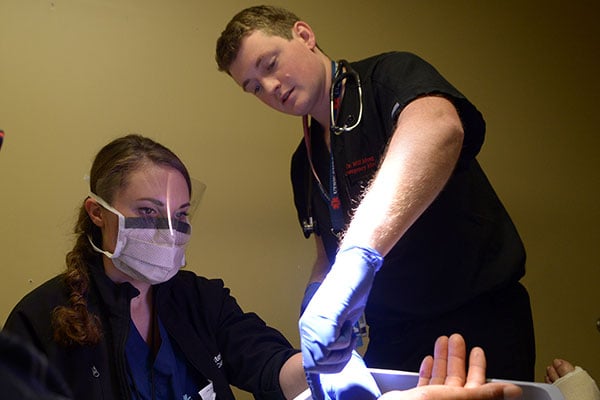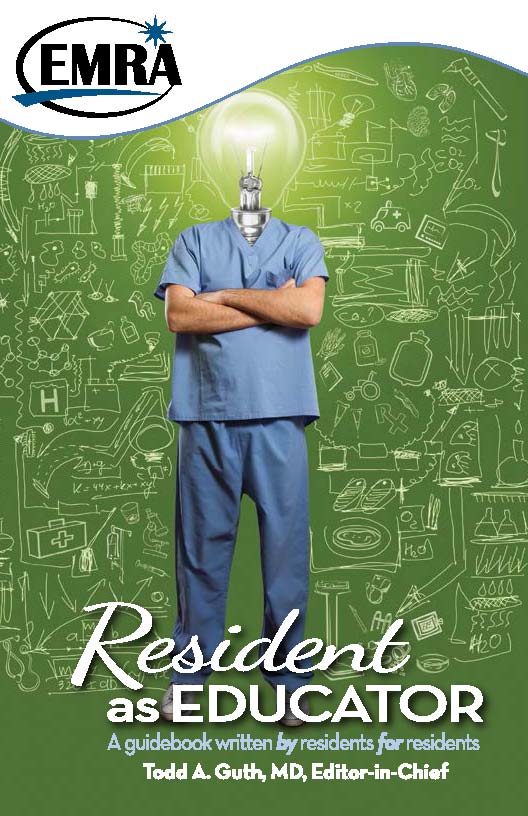Teaching on the Fly

Teaching on the Fly
May 15, 2019
In this episode we will focus on practical teaching strategies with Dr. Liu and Dr. Gallegos, covering topics from self-directed learning opportunities, debriefing and brief pearls in the form of digestible teaching moments.
Host
Alexander Kaminsky, MD
University of California San Francisco – Fresno
PGY4
@Alex_KamskyEM
EMRA*Cast Episodes
Guests
Moises Gallegos, MD MPH
Assistant Professor at Baylor College of Medicine
@moyinscrubs
Jeff Liu, MD
Chief Resident, Baylor College of Medicine
Overview:
Residents play an important role in medical education to our peers, students, nurses and patients. Internal medicine, surgery and just about every other specialty enjoys the luxury of down-time to reflect on recent presentations or formal didactics, often after rounds. The continuous and often frantic nature of emergency medicine limits our ability to plan for formal teaching. As emergency physicians we are obligated to know the worst of the worst in all medical specialties. But when do we find the time to teach and learn while at work?
Medicine has long embraced the Socratic method of teaching at the bedside -- however there is way more to teaching than “PIMP” questions!
Key Points
Rule number one: Teaching on-the-fly, while fluid, requires some pre-planning or forethought.
Strategies for teaching on the fly
Courtesy of Dr. Liu and Dr. Gallegos CORD 2019 Hand-out
- Focus teaching session into digestible moments. Micro-learning can facilitate teaching in a fast paced environment that may encounter multiple interruptions.
- Making simple patients sick – the “what if…” game. This is useful when the flow or acuity of patients is low.
- Debriefing – what just happened and why. This is helpful for highlighting important and critical actions.
- Setting your learner up for success – using focused directions, pausing for effect, getting a commitment from your learner. By creating a welcoming environment, the learning opportunity solidifies key concepts.
- Visual pearls around the department – whiteboards, post-it’s, diagrams, etc. These quick ways of highlighting pearls and creating focused learning points can be used to interject teaching into a busy shift that does not allow for dedicated time.
- Self-directed learning activities/challenges – when you really can’t make the time, facilitate the learner’s practice of searching for answers in evidence-based manners and allow them to be the teacher.
Teaching on the fly isn’t always about creating material “on the fly.” Preparation to develop areas of focus, create a repository of teaching points, and exploring of different teaching styles can facilitate deciding to teach on the spot.
Make a commitment to yourself:
Reflective Questions/Thoughts
- Write down at least one skill to work on that you believe can help you improve on-shift education in your department.
- What are some topics that you feel comfortable enough with to convey select learning points/pearls if that type of patient encounter were to take place?
Key Resources and Suggested Reading:
- Wolff et al. Not Another Boring Lecture: Engaging Learners with Active Learning Techniques. The J of Em Med. Vol 48, No 1. 2015.
- EMRA Guide: Resident as Educator -- A guidebook by residents for residents. By Guth MD et al.
Related Content

May 26, 2023
PD Interview Saks at Crozer Chester
In the latest installment of our PD Q&A series, we are highlighting the Crozer Chester Medical Center Emergency Medicine Residency program. We spoke with the current PD Dr. Mark Saks, MD, about what makes his program unique and what he looks for in potential residents.

Apr 16, 2023
Taking to the Sky: Launching an EM Resident Flight Physician Program
Resident involvement in air medical transport leads to significant mutual benefit for residents, residency programs, and flight programs. Residents gain unique clinical experiences and broaden their understanding of AMT and diversity of care settings. Residency programs benefit from the experiences of their residents. Flight programs gain enthusiastic and knowledgeable groups of new physicians who can augment the organization’s educational and clinical capabilities. Starting a resident flight program requires careful planning and significant coordination of stakeholders, but the result is an outstanding clinical experience for clinicians and patients alike.

Jan 17, 2024
Optimism vs. Realism — Let’s Call it a Tie
As the voice of emergency medicine physicians-in-training and the future of our specialty, EMRA continues to believe that the future of EM is bright while remaining committed to facing reality and addressing our headwinds. I invite you all to join us in this Stockdale Paradox-esque approach.





